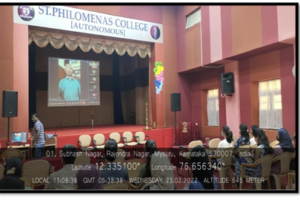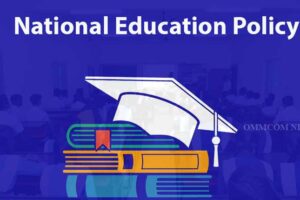A Six Day online lecture workshop on ‘Energy Bands In Solids And Electrical Transport Properties of Metals and Semiconductors’,
St. Philomena’s College(Autonomous) , Mysuru.
The Physics department of St. Philomena’s College is hosting a six day online lecture workshop on the topic ‘Energy Bands In Solids And Electrical Transport Properties of Metals and Semiconductors’, from 23-28 November 2020, with two lectures per day.
The purpose of this webinar is to provide deep understanding on reciprocal lattice and its importance, Brillouin zones, how electron energy bands arise in solids and how they influence the transport properties like electrical conductivity and thermopower. The lectures aim to address certain key points like methods of measuring band gap ,mobility of charge carriers and why thermopowers of semiconductors are large and how they can be used for cooling purposes.
The resource persons for this workshop are Prof. R.Srinivasan,Retired Director,UGC – DAE Consortium for Scientific Research, Indore (MP) and Prof. G Umesh , Professor of Physics(Retd), NITK Suratkhal.
The program is supported by the Indian Academy of Sciences, Bangalore.
The program will be inaugurated by Dr. N.K. Lokanath, Professor and Chairman,DoS in Physics,Manasagangotri,Mysuru and Director,PMEB, University of Mysore,Mysuru, on 23 November 2020 at 11.00am. Msgr.Leslie Moras,Episcopal Vicar, MDES, Mysuru will preside over. Rev. Fr. Dr. Bernard Prakash Barnis, Rector/Manager, St. Philomena’s College, Mysuru, Dr. T. Ruth Shantha Kumari, Principal, St.Philomena’s College, Mysuru, Prof. Othbert Pinto,Director, PG Studies and Research Centre, St. Philomena’s College, Mysuru will be present.
More than 360 participants including Faculty,Research Scholars and Students are participating in the program.
Prof. R. Srinivasan, Retired Director UGC – DAE Consortium for Scientific Research, Indore (MP), is the Convenor and Prof.Shobana Thomas, Head of the UG Department of Physics is the Co-ordinator.
REPORT
Department of Physics
St. Philomena’s College (Autonomous), Bannimantap, Mysuru
Science Academies’ Six day Online Lecture Workshop
on
“Energy bands in Solids and Electrical transport properties of metals and semiconductors” held during 23-28 November, 2020
Report
A Six day Science Academies’ Lecture Workshop on Energy bands in Solids and Electrical transport properties of metals and semiconductors was organized for College teachers, University teachers, undergraduate, postgraduate and research students from 23-28 November, 2020 at St. Philomena’s College(Autonomous), Mysore. The program was sponsored by the Science Education Panel of the three National Science Academies, namely the Indian Academy of Sciences, Bangalore, the Indian National Science Academy in Delhi and the National Academy of Sciences in Allahabad.
Prof. R. Srinivasan, Retired Director, UGC-DAE Consortium for Scientific Research, Indore (MP) was the Convener and Prof. Shobana Thomas, Head of the UG Department of Physics, St. Philomena’s College, Mysuru was the coordinator of the programme .The resource persons were Prof. R. Srinivasan and Prof. G. Umesh, Professor of Physics (Retd), NITK Surathkal. Two lectures from 11 AM to 1 PM were scheduled for 6 days
The event was inaugurated on 23rd morning at 11:00 am by Prof. N.K.Lokanath, PMEB Director / Chairman, DoS in Physics, University of Mysore, Manasagangotri, Mysore as the chief guest. Msgr. Leslie Moras, Episcopal Vicar, MDES, Mysuru presided over the programme. Rev. Fr. Dr. Bernard Prakash Barnis, the Rector/Manager of the college, Dr Ruth Shanthakumari, the Principal of the College, Prof. Othbert Pinto, Director, PG Studies and Research Center were the guests of honour. The Course Director Prof.R.Srinivasan, Coordinator Prof. Shobana Thomas, Resource person Prof. G. Umesh were also present.
Dr. T. Ruth Shanthakumari, the Principal of the College delivered the welcome note. Prof. Shobana Thomas briefed the significance of the lecture workshop and also introduced the chief guest. Professor N.K Lokanath in his inaugural talk emphasized on the ease that technology has made today. Also he stressed on the importance of such education programs for students and teachers and congratulated the college on organising such a program. Msgr. Leslie Moras in his presidential remark mentioned how man has made progress in the field of science and technology. He added, learning is a never ending process and this six day online lecture workshop is one such opportunity for the participants to expand their knowledge.
The inaugural session was formally concluded with the vote of thanks by Prof. G. Rajalakshmi
In the first six lectures, Prof. Srinivasan introduced the concept of reciprocal lattice and explained its importance in understanding X ray diffraction and the interaction between waves in crystals. He then talked about the construction of Brillouin zones in two and three dimensions. He pointed out how wave vectors in the reciprocal lattice can be mapped on to the first Brillouin zone. The concept of extended and reduced zone schemes was illustrated taking the case of the energy of the free electron as a function of wave vector. How the presence of a periodic potential causes gaps in the band structure of the electron was explained. The band structure in Gallium Arsenide and in Silicon was discussed to show the difference between a direct band gap and indirect band gap semiconductor.The effective mass approximation was discussed and the concept of a hole was explained. The technique of cyclotron resonance for the measurement of effective mass was described. The number density of states for a free electron gas in three dimensions was shown to be proportional to the square root of the energy. Expression for the Fermi level in terms of the number density of electrons was derived. The partial filling of overlapping s and d bands in iron was discussed. The position of the Fermi level in an intrinsic semiconductor was derived.
In the next six lectures, Prof. G. Umesh talked about the scattering of the charge carriers by phonons, defects and electrons, and derived an expression for the electrical conductivity. He talked about the temperature dependence of the electrical conductivity of metals. He explained how s-d scattering in iron affects the temperature dependence of the resistivity of that metal. He discussed the temperature dependence of resistivity of a semiconductor. He explained the Hall effect, and how it can be used to measure the number density of charge carriers. He talked about a direct measurement of mobility in a semiconductor by measuring the time of drift of a pulse of charge carriers created at one point in a semiconductor using a laser pulse. He talked about different methods to measure the band gap in a semiconductor. He then defined the Peltier and Seebeck coefficients of a material, and derived the relation between the two. He derived the expression for the Seebeck coefficient, and explained why the Seebeck coefficient in a semiconductor is higher than that in a metal. He talked of thermoelectric coolers using the Peltier effect, and explained their merits and demerits.
During the online lectures, the participants had an opportunity to ask questions and make comments. Detailed lecture notes with problems were made in advance, and a soft copy was sent to each registered participant.
On day-6, there was a brief valedictory programme between 12:30 and 1:00 pm. Prof. R. Srinivasan was the chief guest, Rev. Fr. Maria Xavier, Vice-Rector, St. Philomena’s College (Autonomous), Mysuru presided over the valedictory session. Alongside were present Prof. Othbert Pinto, Director, PG Studies and Research Center, Prof. G. Umesh as Guests of honour. Also the Coordinator Prof. Shobana Thomas, Prof. D. Revannasiddaiah were present. Prof. Shobana Thomas welcomed the guests and participants to the session. Three of the participants voiced their opinion about the lecture workshop and made appreciative comments. Prof. R. Srinivasan in his speech expressed that this was the first ever non-contact lecture workshop he had organized and also appreciated the interest of participants in attending the workshop. He expressed his gratitude towards the organizing committee. Rev. Fr. Maria Xavier in his presidential remark emphasized on the opportunities that Science and Technology is rendering to expand one’s knowledge. He also thanked everyone who made this programme a successful one. The programme concluded with a vote of thanks proposed by Mr. Felan Amal. Asst Prof Dept of PG Physics.
.The department organized this lecture workshop for the first time through Zoom, a virtual platform which could accommodate a maximum of 100 participants and was also simultaneously LIVE streamed on YouTube. 400 participants had registered from different parts of India and n
early 200 students and teachers from local colleges and different states participated in the online
lecture workshop which is very encouraging. The participation of students/teachers during discussions was good and the quality of discussions was high. Feedback was collected from the participants via Google form and E- Certificate was issued to the participants on submission of the feedback form. Overall, the online lecture workshop was very successful.




